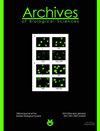紫茎泽兰倍半萜F1012-2在人乳腺癌中调控p53/NF-κB信号通路
IF 0.8
4区 生物学
Q4 BIOLOGY
引用次数: 0
摘要
F1012-2是一种新型倍半萜内酯,从中草药泽兰中分离得到,具有抗肿瘤作用。在这项研究中,我们研究了F1012-2对10种人类乳腺癌细胞系的抗癌活性,并证明了F1012-2对三阴性乳腺癌(TNBC)的IC50值明显低于非TNBC细胞系。转录因子p53和核因子-?NF- B是肿瘤发生的重要调节因子。F1012-2不仅使突变型p53消失,而且激活了野生型p53。F1012-2降低磷酸化p65和p105 F-?B家族成员和协同调节的p53, NF-?B成员及其从属目标。为了进一步阐明p53的关键作用,我们使用慢病毒小发夹RNA (shRNA)感染来敲低MDAMB- 231细胞中的p53。F1012-2显著降低了对细胞增殖和凋亡的抑制作用,而p53、NF-?B家族成员及其依赖基因差异不显著。F1012-2在MDA-MB-231异种移植物中表现出明显的抗肿瘤作用,并降低p53的表达。综上所述,我们的研究结果表明F1012-2对TNBC具有抑制作用,并影响p53/NF-?B信号通路。本文章由计算机程序翻译,如有差异,请以英文原文为准。
Eupatorium lindleyanum DC. sesquiterpene fraction F1012-2 regulates p53/NF-κB signaling pathways in human breast cancer
F1012-2, a novel sesquiterpene lactone isolated from the Chinese herbal medicine Eupatorium lindleyanum DC, exhibits an antitumor effect. In this study, we investigated the anticancer activities of F1012-2 on ten human breast cancer lines and demonstrated significantly lower IC50 values for triple-negative breast cancer (TNBC) than for non-TNBC cell lines. The transcription factors p53 and nuclear factor-?B (NF-?B) are important regulators of tumorigenesis. F1012-2 not only depleted mutant p53, but also activated wild-type p53. F1012-2 reduced the expression of phosphorylated p65 and p105 F-?B family members and coregulated p53, NF-?B members and their dependent targets. To further clarify the key role of p53, lentivirus small hairpin RNA (shRNA) infection was used to knockdown p53 in MDAMB- 231 cells. F1012-2 significantly reduced the inhibitory effect on cell proliferation and apoptosis, while the levels of p53, NF-?B family members and their dependent genes were not significantly different. F1012-2 exhibited a significant antitumor effect and reduced the expression of p53 in MDA-MB-231 xenografts. Taken together, our results show that F1012-2 exhibited an inhibitory effect on TNBC and affected the regulation of p53/NF-?B signaling pathways.
求助全文
通过发布文献求助,成功后即可免费获取论文全文。
去求助
来源期刊
CiteScore
1.40
自引率
0.00%
发文量
25
审稿时长
3-8 weeks
期刊介绍:
The Archives of Biological Sciences is a multidisciplinary journal that covers original research in a wide range of subjects in life science, including biology, ecology, human biology and biomedical research.
The Archives of Biological Sciences features articles in genetics, botany and zoology (including higher and lower terrestrial and aquatic plants and animals, prokaryote biology, algology, mycology, entomology, etc.); biological systematics; evolution; biochemistry, molecular and cell biology, including all aspects of normal cell functioning, from embryonic to differentiated tissues and in different pathological states; physiology, including chronobiology, thermal biology, cryobiology; radiobiology; neurobiology; immunology, including human immunology; human biology, including the biological basis of specific human pathologies and disease management.

 求助内容:
求助内容: 应助结果提醒方式:
应助结果提醒方式:


